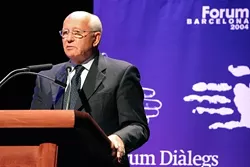Ever wonder how our country ended up like this? As this year sputters to its end, that is, and children are being thrown off cash assistance forever in the dead of winter, and we are letting our roads fall apart, and few seem to give a damn about the next generation.
How did it come to this? It wasn't always this way. Fifty years ago, we were a strong and confident country, committed to making this a better world, thinking we could educate more kids.
Thinking we could help the rest of the world too. Presidents could propose programs like the Alliance for Progress to help lift up Latin America. The statesman Sargent Shriver led a major effort to conquer poverty in this country, and continued to believe, until the day he died earlier this year, that's something we could have done.
Today, any politician who even suggested that we do something to help the nation's poor would be sneered at as a socialist. For the last 30 years, there has been a massive transfer of wealth from the poor and the fast-disappearing middle class to the super-rich. Do you see any major effort to suggest moving toward even a slightly more level playing field?
Does any major Democratic politician, in Lansing or Washington, dare to stand up and say, "It's time to increase taxes on the super-rich so students can get scholarships and poor children can get milk?" Don't be silly. They'd be afraid of losing votes because bloated radio fools like Rush Limbaugh would call them names.
How did we get to this place from the idealistic nation we were? For a large part of the answer, look back to a Christmas exactly 20 years ago, to an event that set the stage for everything that has followed. Mikhail Gorbachev, the last head of the USSR, appeared on television screens across the globe that Christmas morning.
Everything was truly over. He announced he was resigning, and that the nation that had been our mortal enemy had ceased to exist.
Nobody paid a whole lot of attention at the time. The Soviet Union had been dying since a failed coup that summer. The Cold War, which even eight years before still had the power to grip us with nuclear terror, had ended when the Eastern European states gave up communism and opted for what they saw as freedom, more or less, two years before that. When the end of the USSR became official that Christmas morning, we barely glanced up from our presents.
But something very fundamental had changed. A few years after that, Dick Wright, who taught journalism with me at Wayne State University, stopped by my office. He had studied the Soviet Union in army intelligence and spoke and understood Russian.
He also cared about the labor movement, and about workers in America, and he made a casual comment that I instantly saw held the key to a lot of what was going on in this society.
"You know, I really felt that people here didn't realize how bad it was when the USSR ceased to exist," he said. "It was corrupt and all that, of course, but it was officially a workers' state. They had gotten rid of the capitalists. And while you never would have wanted to live there, I always felt it was a good thing that it existed.
"That's because as long as it was there, there would always be the thought in the bosses' minds that maybe we better show some decency to our workers, pay them a decent wage."
Dick Wright, a truly decent man, died a few years later. I'm not sure whether he was right about the example of the Soviet Union serving as a deterrent to the nation's exploiters. I know that Franklin D. Roosevelt and a lot of other people believed in the 1930s that either we do something for the ordinary man, or we risked communism or, more likely, some form of fascism.
But most of the exploiters of his day were too stupid to see that the patrician FDR and his New Dealers were working hard to save them from themselves. If anything, today's seem even stupider.
Corporate America and the Republican Party seem to think they can export all the jobs overseas, end unemployment insurance and welfare for those they've screwed over, all with no negative consequences to themselves. The not-so-big-three are now paying newly hired autoworkers salaries too small for them to be able to afford new cars, much less a house and a family.
Let's see ... doesn't all this remind you of a book by Karl Marx called Das Kapital? Does anybody other than me remember how it turned out? We are creating an ever larger, ever more desperate class of unemployed and unemployable people.
We need to wake up and remember that we are all in this together, or, once again, as John F. Kennedy said half a century ago, "If a free society cannot help the many who are poor, it can't save the few who are rich." We desperately need leaders who are not too stupid or greedy to understand that, and need to find them soon.
Snyder puts his foot in it: Whatever you think of his policies, our governor has had a remarkably successful year.
The Legislature enacted virtually his entire program, from the huge business tax cut to the pension tax. His only main setback was over the needed New International Trade Crossing bridge, where he evidently miscalculated Matty Moroun's ability to buy the lawmakers.
Look for more of that epic struggle soon. Up to now, Snyder has avoided messy social legislation, or hatefully attacking the unions to the extent that the governors of Ohio and Wisconsin have.
But he may have blundered badly last week, when he signed the bill that outlaws extending health care and other benefits to the domestic partners of state employees. The governor pretended this was about "spiraling costs." In fact, this was really a gay-bashing measure, and he was pandering to the far right by signing it.
That will lose him some people forever. But there is a bigger problem that virtually guarantees that the state will pay out more in legal fees than it saves. Under the Michigan Constitution, the state universities have the right to make their own rules. The governor first said he wouldn't sign this law if he thought it applied to them.
When Snyder did sign it, he said he was convinced it didn't apply to people employed by universities or the partners of state civil service workers. But what he thinks doesn't mean much.
Plenty of others, including the right-wing Republicans who pushed this through the lower house, think it does ban universities from providing domestic partner benefits, and they are determined to drag this into the courts and fight that battle out.
The universities are already defiantly circling the wagons. Within hours after the signing, Wayne State University President Allan Gilmour said he was convinced the school still could legally provide such benefits, and planned to do so.
Snyder could have avoided this by simply refusing to sign the bill and sending it back, saying he needed the law rewritten to specifically exempt university employees,. But he didn't do that. The result will be what he might end up seeing as a "relentless negative distraction."






